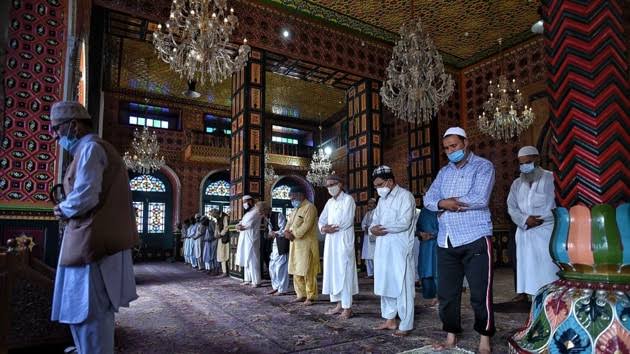Countdown for liberating PoK begins : J&K Shrines Cannot Remain Separated By LoC

The Indian Parliament’s resolution has unequivocally stated “Pakistan occupied Jammu and Kashmir is an integral part of India and Pakistan should vacate it.”. This was once re stated by the Raksha Mantri while speaking at a function on Sunday, organized in Jammu by an RSS offshoot Jammu Kashmir People’s Forum. The function commemorated the 23rd anniversary of the Kargil war. The tone of Shri Rajnath Singh was measured, no anger in it, perhaps that’s why his words resounded more to the ears of the audience comprising large number of kin of the martyrs of the Kargil war of 1999. It was also taken note of in rest of the country.
Shri Rajnath Singh who is number 2 in the Indian Cabinet, gave a politico -military high-voltage message not only to Pakistan but also to China, after having delivered an answer to the query as a backgrounder: “How is it possible that Lord Shiva’s iconic (shrine) Baba Amarnath is in this part (of J&K) and the revered Hindu deity Sharda Devi across the Line of Control, ( in Pakistan occupied Jammu and Kashmir).
It may have appeared to be a simple reiteration of the statements that all Indian leaders irrespective of their political affiliations have been making all these years, especially after the Parliament passed the resolution in 1994 at the time when the militancy was at its peak. However it is a loud and clear message that now India is determined to get back its territories.
The rise in militancy and Pakistan’s machinations had spotlighted the existing problem of Kashmir since 1947 due to India’s not asserting itself. One Robin Raphel, an official of US Govt even had the audacity to question the authenticity of the instrument of accession that Maharaja Hari Singh had signed in October 1947, acceding the whole of the princely state of Jammu and Kashmir to India.
The parliamentary resolution, declaring the whole of Jammu and Kashmir, Ladhak including all the territories – POJK and Gilgit Baltistan( includes Shakhgam Valley ) and Chinese Occupied Ladhak as inalienable parts of India, represents the India’s will, and also message to the world community especially China, the USA and the problem creator —UK, that J&K was non-negotiable. In particular, it was a clear warning to Pakistan that at the time of its own chosing, things will be restored, using force if required.
Pakistan had pressed the US to play the role of a mediator, which thought of itself as the sole superpower in the world that had come into being after the collapse of the Soviet Union and its retreat from Afghanistan.
Raksha Mantri had earlier made a mention of the abrogation of Article 370 – under which Jammu and Kashmir was given a special status within the Indian union for an unspecified period. Finally the government of India led by Prime Minister Narendra Modi accomplished equality and justice for all of J& K pending since the 1950s when Shyama Prasad Mukherjee had raised serious question against two constitutions, two heads of state, two flags in the same country. That was the basis of the campaign “ Ek Nishan, Ek Vidhan, Ek Pradhan( one flag, one constitution and one head of the state).
What made Rajnath Singh’s statement more important after he had questioned that how could one shrine of Lord Shiva be here and other across the LoC, were a Clear Warning and also advice for Pakistan: “ I wish God almighty bless Pakistan with wisdom.” That, rad in the context in which he delivered his speech and the backdrop of the Kargil war and honouring the warriors and their families, it could be that Islamabad-Rawalpindi should desist from any misadventure, and should vacate all the occupied territories and handover them to India.
The Raksha Mantri spoke for the whole of India that misadventures would be met with a befitting response, therefore it was better for Pakistan to choose between peace and war. Added to that was his recall that how Pakistan had suffered humiliating defeats in 1947-48, 1965 and 1971 and also in the Kargil war.


